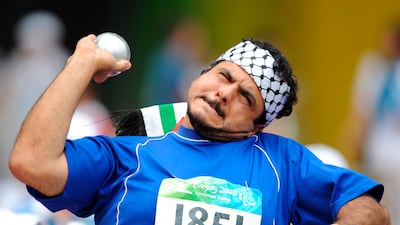Live updates: Follow the latest news on Israel-Gaza
While many Olympic and Paralympic hopefuls are training and competing to secure their places for the Summer Games in Paris, two-time Paralympic medallist Husam Azzam is trapped with his family in the north of Gaza.
They are struggling to survive and sheltering in their home, which has been badly damaged in the continuing war.
“There is constant bombing around us. We are hungry and we don’t have enough food and supplies,” Azzam tells The National.
He is a five-time Paralympian who first competed at Sydney 2000.
Azzam is Palestine's most successful athlete at the Paralympics, winning a bronze medal in Sydney and then a silver in Athens 2004 in the men’s shot put – F53/54 category.
He was the sole Palestinian representative at Tokyo 2020 under immensely difficult circumstances. Now his only focus is on keeping him and his family alive.
Since the Israeli bombardment began in Gaza almost six months ago, more than 32,400 Palestinians have been killed, many of them in northern Gaza where Azzam lives.
The Israeli military began its offensive after the Hamas-led attack on southern Israel on October 7, when militants killed about 1,200 people and took about 240 hostages back to Gaza
On October 13, less than one week into the fighting, Israel ordered the UN to evacuate northern Gaza, instructing residents to move south.
As hundreds of thousands fled to the south, some were bombed by Israel as they travelled along a supposedly safe route, a tactic that has been deployed regularly by the Israelis.
Azzam is one of the roughly 300,000 Palestinians left in northern Gaza, cut off from aid and facing starvation.
“I have to stay here because I can’t move anywhere,” Azzam said. “Most of my family members are handicapped including myself, so it’s hard to move around.”














The Paralympian was paralysed from having polio when he was three years old, while his two sons and daughter all have physical disabilities that make moving around in war-torn Gaza incredibly challenging.
Despite this they have done all they can to remain safe.
“We moved around a little bit to neighbouring houses of families and friends as well as shelter schools but eventually came back home because nowhere is safe,” Azzam said.
It was during the last Paralympic Games that Azzam’s second son, Mohamed, was shot by an Israeli sniper in the leg during demonstrations along the Gaza/Israel border in August 2021, just a few days before Azzam was due to compete in Tokyo.
Mohamed survived but had to have his leg amputated. His older brother, Kamal, was also shot by Israeli forces during a similar protest in 2018, which has left him severely disabled. Azzam’s daughter was also born with cerebral atrophy.
But because of their disabilities, getting access to any of the small amount of aid that is being dropped into northern Gaza by parachute is almost impossible.
“There are no supplies or food. The only aid we’ve had are two bags of 1kg flour and that is not enough for our family at all.”
With the scarcity of food and increasing fears of famine, Azzam is, understandably, worried his entire family could die. A report released by the UN’s Integrated Food Security Phase Classification last week warned that 70 per cent of the population of Gaza is suffering from “catastrophic” levels of hunger.
On Sunday, UNRWA announced that Israel would not be permitting any of its aid lorries into northern Gaza. This comes after Israel accused the agency that 12 of its 30,000 employees were members of Hamas, claims that have yet to be verified, but have resulted in the agency having most of its funding cut.
As a result, Azzam, along with the other remaining residents of north Gaza are facing starvation. He says that even the aid drops that started at the beginning of March into the area are unsafe to reach.
“At the moment no one is able to reach the supplies in the north because the occupation army fires at and attacks anyone getting close to Kuwait circle and the areas designated for dropping aid,” he said.
Azzam has experienced personal tragedy under Israeli bombardment before.
In the 2008 Gaza war, he lost his parents after his home in Jabilia refugee camp was directly hit in an Israeli strike. The grief caused him to retire from sport.
Having started a new family and a new life, Azzam was convinced to compete again in the Rio 2016 Paralympic Games and again in Tokyo 2020.
However, the family's lives now hang in the balance. He says Israeli strikes have already damaged his home.
“When we came back home it was a chaotic situation with destroyed windows and doors,” says the Paralympian.
“We are doing everything we can to survive.”


